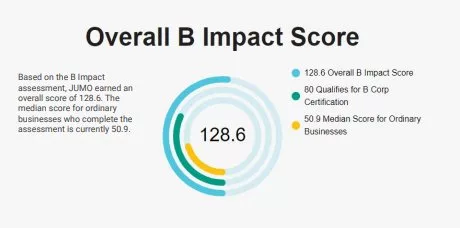
Top tech companies in South Africa
By 2030, South Africa aims to have one million people trained in the fields of robotics, artificial intelligence, coding, cloud computing and networking[1].
One million people. That target is both an expression of ambition and an acknowledgement by South Africa’s government that a digital transformation is imperative for the country to pursue economic growth. It’s also not a small number in the context of unemployment, which ranges roughly between seven million and eleven million (depending on how “unemployed” is categorized).
South Africa’s economy will certainly need those tech-trained young people, for economic growth has been elusive in the last decade. GDP per capita in 2019 was lower than in 2008[2] and that was before the country got hit by the trifecta of the Covid-19 pandemic, an energy crisis and persistent inflation[3]. With research experts predicting the ICT market to grow at a rate of 9.3% for the next 5 years[4], investing in people who can drive technological advancement makes even more sense.
And it’s not “merely” the prospect of employment for one million people; it’s also the ripple effect that those skilled participants in the labour market might have in driving and supporting growth across society. It’s about how their innovativeness and higher education might open the doors to a better life for themselves and their communities. In South Africa that can mean lifting thousands — if not millions — out of poverty.
Related reading: The biggest challenges for Fintech in Africa in 2024
Our pick of top tech companies in South Africa
So what are then, some of the top tech companies in South Africa those young people might want to consider? Some of the biggest tech companies in the world have offices in South Africa. For this article, we decided to focus on local software and IT companies in Pretoria, Johannesburg and Cape Town that are worth a look. We intend to update it to include other cities as our editorial calendar permits.
Table of contents
- Top technology companies in Johannesburg
- Top technology companies in Cape Town
- Top technology companies in Pretoria
- Top tech companies in South Africa — References
Top technology companies in Johannesburg
The largest city in South Africa, Johannesburg has a lot going on for it. The nation’s largest stock exchange — the crown jewel of the financial industry — is based there and has certainly played a big role in attracting the talent and investment that eventually helped the city nurture a flourishing fintech sector. And while the city still ranks below Cape Town in terms of investment in tech and the value of its startup ecosystem, things are slowly changing.
Here are four tech companies we think are worth checking out:
Kena Health
According to the latest data from WHO (World Health Organization), if you are born in South Africa, you can expect to live until you’re 65, which is about 8 years lower than the global average of 73. That expectation lowers to 56 if you account for what the WHO refers to as healthy life expectancy, meaning the number of years lived without health limitations imposed by illness or injury[5].
Sadly, many deaths in South Africa are preventable. The leading cause, HIV/AIDS, is not only preventable but manageable with the appropriate medication. A similar story can be told about many diarrhoeal diseases or tuberculosis.
Kena Health is on a mission to alleviate some of that suffering. In what is a great example of how technology can bring good to the world, it has developed an app that connects patients with healthcare professionals.
Patients can arrange for a consult over text, phone or video call. A consultation costs R185 which is not cheap considering that the minimum wage is R25,42 per hour. Yet, in a country with a stressed public healthcare system and where the overwhelming majority of the population doesn’t have private insurance, it certainly gives people options. The company also partners with businesses, enabling them to offer Kena Health consultations as a perk to their employees.
Both the public and private investors seem to agree on its merit. Kena Health’s app has a rating of 4.9 on Apple’s App Store and 4.8 on Google Play, which no doubt helped it in May 2023, when it secured $2 million in investment from private investment firm, Next176.
Everlytic
Like so many software companies over the years, Everlytic started in a garage. In the almost 20 years since it has outgrown it to the point of opening an office in the UK. And while the vast majority of its staff is still based in Johannesburg, it can, perhaps, be optimistic about expanding.
The company accelerated from 2010 onwards when it fully embraced the goal of becoming an omnichannel communications platform. This meant developing software capable of sending bulk email and SMS campaigns, managing creatives, handling customer data, orchestrating marketing automation and doing so with an interface and pricing capable of competing with the likes of email marketing leaders SendInBlue (now Brevo) or MailChimp (now Intuit MailChimp), as well as full-fledged marketing automation platforms, like Hubspot or Omnisend. Tall order!
Undaunted, Everlytic forged ahead. Reading through its case studies and testimonials, one is inclined to believe that the bet paid off. What stands out about those testimonials, is how often customer service is mentioned, with several highlighting the responsiveness and helpfulness of the Everlytic team (something that is also remarked on its G2 page).
On that note, it’s worth pointing out that Everlytic offers customers Full and Partial Managed Services and integrates with Channel Partners, which is not something that many omnichannel marketing platforms do. Undoubtedly that allows it to keep its ear close to the needs of customers and respond quickly to concerns or requests, something that many clients will certainly value. It’s also a competitive advantage in today’s age of unpersonalized support chatbots that so many software companies use.
Sybrin
It’s impossible to talk about technology companies in Johannesburg and not mention Sybrin. For starters, it’s a great example of a success story out of South Africa, employing more than 350 people — 200 of them in Gauteng — and with clients in more than 15 countries. It’s homegrown information technology talent, developing solutions that are used around the globe. It has to be featured in our list.
But what does Sybrin do, exactly? The short answer is ‘Digital Transformation’. How that translates into an offering is a different matter.
For starters, Sybrin works with clients in a way that is not dissimilar to a service provider. Once it understands their needs it can advise, design and support them in implementing the best possible solution. It does so across four main categories: digitisation, payments and clearing, fraud and risk management and, finally, identity and onboarding.
Because it offers solutions across categories, it can integrate them to dovetail to a customer’s needs. It acts as a one-shop-stop of technology solutions.
For example, banks need to document digital signatures (digitisation), collect payments (payments and clearing), verify identities (identity and onboarding) and protect customers and assets against fraud (fraud and risk management). Sybrin is the kind of provider that can work with banks across it all and make sure that each solution integrates with the other.
Finally, it does so with cybersecurity and compliance front of mind. As an example, the Biometric Authenticator shown in the video below complies with ISO/IEC 30107-3 regulations. Browsing through its website, this level of compliance seems to be in place for any feature that handles sensitive data.
Naked
We mentioned above how difficult it is to obtain private health insurance in South Africa. It’s not just health insurance though; it’s any type of insurance.
At heart, there are socio-economic factors at play; people will not prioritize insuring goods like their home or their car when they’re struggling to make ends meet. And with inflation driving the cost of living up, insurance of any kind falls further down the priority list.
In the case of car insurance, there are other factors at play; contrary to many countries — particularly in Europe, North America and parts of Asia — car insurance is not mandatory by law. This contributes to only 30% of cars on the road being insured[6], despite high volumes of accidents and theft across the country.
A similar story can be told for property insurance; it’s not mandatory by law and Statstica surveyed that only 24% of South Africans reported having a policy in place[7]. This is a particularly worrying stat. As more and more major climate events cause destruction around the world, it is those most vulnerable that are most affected. And those tend to be more likely to live in dwellings built to poor construction standards while being less likely to have any kind of insurance in place.
It’s in this context that Naked stands to make a difference.
Background

Despite being a medium-sized business, the company does away with brokers and call centres. Instead, it leans heavily on artificial intelligence to run and manage policies. Less overhead and less paperwork mean fewer costs, which Naked leverages to offer competitive pricing to its customers.
Naked is ultimately an insurance company. But it would be remiss not to include them on this list, given how much they’ve embraced application development and how ingrained artificial intelligence is as part of their DNA. Their mobile app perfectly encapsulates their approach; customers can sign up for home insurance without ever speaking to anyone. Same for any claims put through.
It’s also a company with a strong social ethos, which is reflected in its business model. Unlike most insurance companies, Naked doesn’t stand to profit from paying out less in claims. Instead, it charges a fixed flat fee on premiums. What comes of it is what the company calls the “Naked Difference”. At the end of each financial year, any money left in the pot from claims coming in lower than expected is donated to worthy causes. In 2023, Naked donated R650,000.
Any scepticism about how Naked achieves all this is alleviated by the fact that policies are underwritten by Hollard Insurance, a large private insurance group with more than 2,000 employees. This should be reassuring for customers in an industry that has historically been mired in mistrust.
Top technology companies in Cape Town
It’s hard to dispute Cape Town as the leading tech hub of South Africa. Over the last decade, the Western Cape technology sector has received more than R$100 billion in Foreign Direct Investment. That level of financing has encouraged entrepreneurs to pursue ideas while giving developers opportunities to hone their craft locally, rather than moving abroad.
Annette Gardner, Marketing Manager for SOLIDitech, a Cape Town-based company, highlighted the “growing and vibrant tech scene” as one of the reasons behind their success.
Businesses such as ours and so many others have benefited greatly from a thriving startup ecosystem, a strong local University and supporting education system that produces a world-class talent pool. The diversity of the City and the natural environment surrounding us offers a melting pot of ideas and a high quality of life — creating an attractive destination for tech professionals.
Annette Gardner, Marketing Manager for SOLIDitech
Its startup scene has flourished, now estimated to be valued at US$3.4 billion, with the city finally breaking through to the top 100 worldwide, and #3 in Africa (behind Nairobi and Lagos).[8]
“B2B is the recommended focus for tech startups in South Africa. B2C has scale issues — and most importantly, revenue challenges — based on customer expectations of ‘freemium’” said Mike Sharman, Co-Founder and Chief Creative Officer at Retroviral. Mike also highlighted Stellenbosch in the Western Cape as a “hotbed of fintech activity”.
We shortlisted six companies based in Cape Town that we think are worth a look:
Jumo
More than 20 million people — or a third of the South African population — own a smartphone.[9] Overwhelmingly, those people access the internet through a smartphone or tablet (as opposed to a computer). In this context, being easily accessible on mobile is crucial for many businesses.
For the banking industry though, mobile is not just a matter of accessibility. It’s an incredible opportunity to reach more customers at lower fixed costs. With traditional banking, the overhead costs of running a branch or physical location of any kind are ultimately passed to customers. This, in turn, makes obtaining credit more expensive. There’s also remoteness to consider; as internet coverage increases, so does the reach of mobile banking services.
This is where Jumo comes in.
Background
Founded in Cape Town and now with almost 250 employees across 7 locations (in Africa and the UK), the company specializes in building the kind of infrastructure that enables banks, loan/credit companies and government institutions to provide easy access to credit for individuals, startups and medium-sized businesses.
To be more specific, Jumo utilizes machine learning and artificial intelligence to better understand the risk of lending to a customer. Because it does so with limited to no overhead, it reduces the inherent cost that could make a customer unappealing to a bank. It’s also tackling prevailing biases in financial services — particularly in African markets — such as gender biases or transactional bias (for example, someone with a short credit history might be perceived as a risk).

Since it launched in 2015, the company has disbursed more than $5b in funds, among more than 22 million customers reached through the partnerships its technology enables. Equally impressive, the company is B-Corp Certified and earned high marks in its latest evaluation with a score of 128.
Ozow
Ozow is another fintech company fully embracing the possibilities of mobile.

The company offers digital payment services for consumers and businesses — all a customer needs is an online banking account connected to their Ozow account in order to make cardless payments or send money to others.
Their payment options are available for both online and in-store merchants through a wide range of methods, including via SMS, QR codes, in-store point-of-sale or during checkout when buying online.
The range of payment methods likely explains some of its popularity; the company has more than 6 million registered users and works with more than 1,000 merchants in South Africa that likely find their relatively low 1,5% transaction fees appealing.
In November 2021, Ozow announced a $48m Series B funding round, led by Chinese technology company Tencent. At the time, the company highlighted expanding into other African countries as a business objective. While that hasn’t materialized as of yet, it’s likely in the cards. After all, the problem it’s tackling for both customers and merchants isn’t unique to South Africa.
The question then, is, can its success be replicated elsewhere?
Metacom
Ever turned your router on and off multiple times, hoping that might be the reason why your internet is down? Well, if you’re a business, that downtime can be extremely costly. And while the router often gets a bad rep as the source of all internet access troubles, businesses will go to great lengths to make sure their uptime is as safeguarded as possible.
For the last 20 years, across more than 20 countries and more than 20 thousand sites, businesses have come knocking on Metacom’s door precisely for their routers. The company has been designing world-class routing equipment since the internet was in its infancy and has since grown to more than 160 employees, most of them based in Cape Town.
One of the reasons Metacom stands out is its ability to customise its routers to specific client needs. Or, in other words, it’s not just top-of-the-range hardware you’re buying; it’s managed, fit-for-purpose, services, that will take into account whatever your connectivity needs might be. Add to that Metacom Online – which is, essentially, its Network Monitoring software solution — and you really can get all your networking requirements addressed by one single provider.
This level of customisation is not particularly common when it comes to routers and networks at large. In an interview earlier this year, Réan van Niekerk, Founder and Chairman of Metacom, highlighted the ability to listen to customers and be in close geographic proximity to them (particularly in Africa) as a big part of the company’s success.
Root Insurance
To play in the insurance space any new company needs to overcome a number of barriers to entry. Beyond the to-be-expected difficulties of facing established competitors, attracting new customers and developing a brand, there are a number of regulatory requirements that must be met.
In South Africa, that means having a minimum of R$2 million in upfront capital to back up the venture, having risk models and pricing policies in place, obtaining insurance licenses and being reinsured and/or underwritten by another company — just to name a few of the requirements that must be met before a business can start selling to customers.
Root Insurance’s offering is a form of Infrastructure-as-a-Service, designed with the insurance industry in mind. It does all the heavy lifting of integrating with major, existing, insurance providers and then enables customers to develop, customize and sell their own products. Those customers tap integrate with Root through its API, which, among other capabilities, allows them to manage payments, claims, compliance and communication with their customers.
For aspiring insurers, that means short-circuiting their entry into the space and focusing immediately on customer acquisition, retention and service. And while they might be paying Root Insurance a fee for their services, more often than not, that’s the only viable way to launch a business in the space. Unless backed with a tremendous amount of capital, Root Insurance is the way to go.
DataProphet
Manufacturing and cooking have one thing in common; more often than not, they both follow a recipe. That recipe lists the ingredients required, ordered steps to follow, measurements and what is essentially a compilation of processes that, if followed accurately, result in a product ready to be eaten… or shipped. For the sake of the context we are trying to provide, let’s bring those two worlds closer together and look at the example of a food manufacturer, such as a ketchup factory.
As the assembly line goes through the motions of cleaning tomatoes, boiling them at extremely high temperatures, blending them with spices, pouring them into containers and hundreds of other micro-steps in between, the factory relies on a mixture of humans and software to pick up any imperfections that might render a whole batch unusable. It might be a human not screening out a subpar lot of tomatoes. It might be a laboratory sample returning inadequate results.
Whatever it might be, every time it happens, it costs companies money. If it happens repeatedly, even worse. This is where manufacturers turn to companies like DataProphet.
The company offers a form of Ai-as-a-Service that helps factories collate data, sometimes monitoring millions of data points throughout the manufacturing lifecycle. That data can then be analyzed and mined for recommendations on where opportunities for improvement might exist. This kind of functionality is critical for large manufacturers hoping to optimize their yield and increase profitability.
The benefits don’t stop there. Manufacturers deploying smart software solutions like DataProphet are also reducing the amount of waste generated, optimising energy consumption and decreasing CO2 emissions, helping them attain sustainability — and in some cases, compliance — targets.
iiDENTIFii
Digital authentication is still in its early days but it’s clear that its adoption has taken off. The pandemic accelerated the need for records to be collected in a digital format — rather than pen and paper — and, more recently, the proliferation of AI tools capable of impersonating humans has contributed to an increase in the demand for software capable of verifying all sorts of biometrical data.
As it turns out, iiDENTIFii is perfectly placed to capitalize on it all.
Built on Microsoft Azure Cloud and available through Microsoft’s Azure Marketplace, the company has fully leveraged its Microsoft Co-Sell Partner credentials to establish itself as a key player in the region. Last year it announced it had secured US$15M in funding to expand into additional regions and just this month, it launched a new partnership in Zambia with local financial institution Zanaco.
Like its fellow Cape Town tech company Jumo (above), iiDENTIFii’s offering is playing a critical role in enabling those underserved to gain access to financial support otherwise inaccessible to them.
Top technology companies in Pretoria
The nation’s capital might be the centre of administrative power of South Africa, but it has a ways to go when it comes to establishing itself as a major tech hub. The number of information technology companies in Pretoria is nowhere near those in Cape Town or Johannesburg and the startup scene is significantly smaller.
The potential is there though. In addition to the majority of government agencies being based in the city, it’s also home to a substantial number of services companies, priming it as the kind of economic force that can foster innovation.
In 2018, the government-funded Innovation Hub was launched, supporting incubators across smart industries (ICT, Big Data, AI, advanced manufacturing), green economy and biosciences. At the time, those hubs supported more than 260 startups in Pretoria.
Here are three tech companies in Pretoria worth learning more about:
Retro Rabbit
Retro Rabbit will turn 20 years old next year (at least according to its LinkedIn profile). One look at its website suggests that, like most in their twenties, the good times are just getting started.
There are plenty of software development companies in South Africa. With overhead costs being substantially lower than in other parts of the world, and with English being the predominant business language, the country has long established itself as a reliable partner for businesses. There’s a significant amount of software development being outsourced to South Africa as well, which further increases competitiveness.
So how does Retro Rabbit stand out? Well, in addition to developing custom software solutions for clients as varied as Capitec Bank, Yuzzu or First National Bank, it seems to put a significant amount of effort into developing its employees and fostering a fun work environment.

And when we say “significant amount of effort”, we mean it.
Browse through the company’s Instagram and this year alone you’ll see announcements for a company-wide conference, a music festival, a Beerfest and a massive charitable rally across 6 African countries. These sit side by side with numerous smaller events and posts about new hires, career development and general work culture.
Browse through their website and, once again, there’s a focus on highlighting the company’s culture. A passion for engineering and “good vibes” take centre stage, rather than selling anything. For Retro Rabbit, the website is the marketing. It acts as a billboard, signalling to prospective clients that this is a company that understands design, user experience and software engineering like few do.
FlowCentric
Every business, no matter what size, runs on processes. As boring as that might sound, processes, big and small, simple and complex, are the blood vessels that keep a company going. Managing a social media account requires a process; hiring and terminating employees requires a process; sales operations require processes. We could go on and on.
But how does a business stay on top of the processes it runs? As a company grows, increasing in staff, expanding into other markets, opening new offices or operating in new sites, how does it make sure every process is documented, adhered to and, where necessary, discontinued?
This is where business process management (BPM) comes into play and where Pretoria-based FlowCentric stands out. In the more than 20 years the company has been in operation, it has developed proprietary software that helps businesses govern their processes across verticals as varied as supply chain, healthcare and banking.
And make no mistake; once organisations reach a certain size, BPM becomes a must-have, not just a nicety. Take the relatively simple example of payroll. Without solid processes that are well-documented and aided by software to ensure timeliness, companies might miss payments, overpay staff or have the wrong employees have access to sensitive documentation.
It doesn’t stop there. The company also offers support services to clients, which are meant to fully understand their requirements and, if necessary, develop custom solutions that meet their needs. That’s quite powerful, given that business processes are inherently unique to each company. Take ERP, as an example; businesses of a medium-large size will certainly need to consider having an ERP solution in place, but the resources that the platform will help manage will be vastly different from one case to another.
HISP
In what we believe is a first in our series of articles about tech companies around the world, we’re highlighting a tech organization rather than a company. Forgive us for the sleight of hand, but we believe it’s worth it. This is a non-profit organization helping improve the lives of millions of people.
HISP is another example of the South African tech scene leveraging information technology for the greater good. And when we say “information technology”, we mean that in the most literal sense. HISP is utilizing IT to facilitate how information in healthcare is captured, stored, shared and utilized.
Its origin story dates back to 1994, post-apartheid. As part of a research project led by the University of Oslo and the University of the Western Cape, a group of developers and researchers created DHIS, an open-source web-based health information management system designed to help improve how medical data was handled.

DHIS2
By 2006, the software was widely used in South Africa and a second, more powerful, version — DHIS2 — was rolled out in Kerala, India. Today, it is used in more than 80 countries, affecting the lives of 3 billion people. Its latest iteration comes with off-the-shelf tools for data capture — on the field and online — data storage, hosting, visualization and a plethora of others that help Governments, NGOs and private organisations of all kinds make more informed decisions on healthcare.
Today, HISP is far bigger than a research project between two universities. It has grown into a network of NGOs spread around the world, coordinated centrally by the University of Oslo. The Pretoria team employs more than 80 people. Leveraging its more than 20 years of experience, it continues to play a very significant role in the region.
Top tech companies in South Africa — references:
1 – South African Skills Development Program
2 – OECD South Africa Snapshot
3 – World Bank South Africa Overview
4 – Mordor Intelligence Report — South Africa ICT Market Analysis
6 – Car insurance in South Africa
7 – Most common type of insurance in South Africa
8 – Startup Genome 2023 — Cape Town
9 – South African smartphone usage
Top tech companies in other cities
NEXT UP

Ryan Beal, CEO & Co-Founder of SentientSports: “Sports generate some of the richest datasets globally”
We interview Ryan Beal, CEO & Co-Founder of SentientSports, a startup using AI in fan engagement and athlete protection on social media.

Paris 2024: The greenest games ever
How the Paris 2024 Olympic Gamers organisers have lived up to their promise that this is the greenest Olympics ever

Salesforce, Workday team up to launch AI employee service agent
Salesforce and Workday have marked their new strategic partnership with the launch of an AI-powered assistant to handle employee queries.
